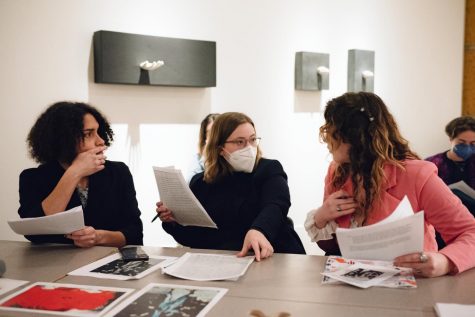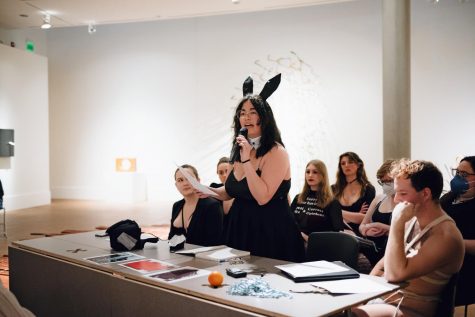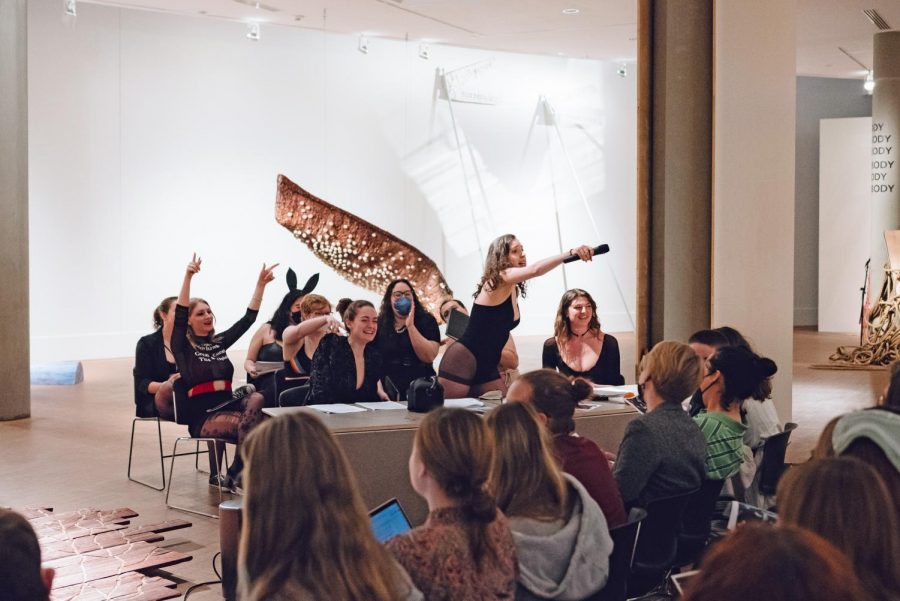Graduating GWSS majors explore ‘bad feminists’ in Sex Wars debate
GWSS fourth-years adopted the position of historical pro-sex and anti-sex feminists for the Sex Wars debate.
March 12, 2023
Graduating gender, women’s, and sexuality studies (GWSS) majors hosted a Sex Wars debate on Thursday, March 9 at the Grinnell College Museum of Art. During the event, GWSS fourth years replicated contentious feminist debates about sex and pornography that occurred during the 1970s and 80s. The debate allowed the GWSS majors to occupy the voices and perspectives of famous feminists, and it provided students with the opportunity to share conflicting opinions about pornography.
The students who participated in the debate were from Leah Allen’s, assistant professor of GWSS, class GWS 495: Bad Feminists, Bad Critics. In the class, students explore feminists who were considered to be “bad feminists” because of their radical views about liberating women. For the purpose of the debate, one half of the class represented the pro-sex feminist ideas, and the other half represented the anti-sex ideas.
Will Donaldson `23, a GWSS major participating in the debates, said that pro-sex feminists believed that misogynistic violence against women was a result of underlying societal structures, not just a result of their portrayal in pornography. The anti-sex feminists, on the other hand, wanted to ban pornography through legislation because of violent portrayals of women prevalent in porn at the time. Donaldson also explained that the divide between pro- and anti-sex feminists was divisive and sparked infighting within the feminist community at the time.
“What the debate really is about is differing approaches to dismantling the patriarchy,” Donaldson said.
Melena Johnson `23 explained that historically, the pro-sex side won the debate because the anti-sex side failed to pass legislation that would have banned pornography. Many of the anti-sex feminists were removed from the history of GWSS because their ideas were opposed by other feminists. In the reenacted debate, Allen said that there would not be a formal winner and the audience could come to their own conclusions.

The event that unfolded in Bucksbaum was, in an effort to emulate the real-life conversations, contentious and heated, with both sides taking shots at the other and rallying the crowd for support. Each took turns advocating for or against pornography and attempted to convince the audience to support their side. There were insults hurled from both sides and lots of drama. The anti-sex side accused the pro-sex side of not taking the debate seriously because of their attire, as the pro-sex side showed up to the event in what some may call risqué clothing. The pro-sex side also ridiculed the anti-sex side for considering Ronald Reagan an ally in their struggle to ban pornography.

“The bigger picture is about the culture of conflict within feminist movements, and both sides did a good job of showing that,” Allen said.
The Sex Wars debate also allowed the GWSS students to explore the ideas of the so-called “bad feminists” and share those ideas with an audience who may have never heard of these ideas before, explained Zoe Gonzalez `23.
“A lot of the arguments, especially on the anti-sex side, are things that are relevant today in terms of things like deep fakes, OnlyFans and privacy issues,” Gonzalez said. “The way that the Sex Wars tend to be framed, in pop culture and things like that, it paints one side as good and one side as evil, but in reality, it’s a gray area both ways.”
The debate was a perfect representation of the personality of the GWSS major, said Donaldson.
“To me, every GWSS class has been this energetic, and filled with controversy and real discourse about not just theory, but how do movements actually work?” Donaldson said. “The value of this is not only that it’s representing the academic side of GWSS, but it’s also showing how much fun and how political our lives can be given the systems we interact with on a daily basis.”





















































